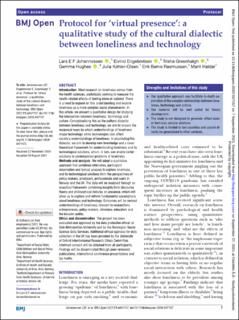| dc.contributor.author | Johannessen, Lars E. F. | |
| dc.contributor.author | Engebretsen, Eivind | |
| dc.contributor.author | Greenhalgh, Trisha | |
| dc.contributor.author | Hughes, Gemma Lucille | |
| dc.contributor.author | Köhler-Olsen, Julia | |
| dc.contributor.author | Rasmussen, Erik Børve | |
| dc.contributor.author | Haldar, Marit | |
| dc.date.accessioned | 2021-11-10T15:10:14Z | |
| dc.date.available | 2021-11-10T15:10:14Z | |
| dc.date.created | 2021-09-20T11:58:23Z | |
| dc.date.issued | 2021-09-07 | |
| dc.identifier.issn | 2044-6055 | |
| dc.identifier.uri | https://hdl.handle.net/11250/2828933 | |
| dc.description.abstract | Introduction: Most research on loneliness comes from the health sciences, statistically seeking to measure the health-related effects of feeling alone or isolated. There is a need to expand on this understanding and explore loneliness as a more complex social phenomenon. In this article, we present a qualitative design for studying the intersection between loneliness, technology and culture. Conceptualising this as the cultural dialectic between loneliness and technology, we aim to unpack the reciprocal ways by which understandings of loneliness shape technology, while technologies also affect society’s understandings of loneliness. In elucidating this dialectic, we aim to develop new knowledge and a novel theoretical framework for understanding loneliness and its technological solutions, which, in turn, can enable better solutions to contemporary problems of loneliness. Methods and analysis: We will adopt a qualitative approach that combines interviews, participant observation and textual analysis to explore loneliness and its technological solutions from the perspectives of policy-makers, producers, professionals and users in Norway and the UK. The data will be analysed through an analytical framework combining insights from discourse theory and philosophical debates on presence, which will allow us to capture and rethink fundamental assumptions about loneliness and technology. Outcomes will be revised understandings of loneliness, relevant to researchers, entrepreneurs, policy-makers, clinicians, educators and the broader public. Ethics and dissemination: The project has been evaluated and approved by the data protection officer at Oslo Metropolitan University and by the Norwegian Social Science Data Services. Additional ethical approval for data collection in the UK has been provided by the University of Oxford Interdivisional Research Ethics Committee. Informed consent will be obtained from all participants. Findings will be disseminated through peer-reviewed publications, international conference presentations and lay media. | en_US |
| dc.description.sponsorship | The project is funded by the Norwegian Research Council (grant no 301840). | en_US |
| dc.language.iso | eng | en_US |
| dc.publisher | BMJ Publishing Group | en_US |
| dc.relation.ispartofseries | BMJ Open;Volume 11, Issue 9 | |
| dc.rights | Navngivelse-Ikkekommersiell 4.0 Internasjonal | * |
| dc.rights.uri | http://creativecommons.org/licenses/by-nc/4.0/deed.no | * |
| dc.subject | Loneliness research | en_US |
| dc.subject | Technology | en_US |
| dc.subject | Culture | en_US |
| dc.subject | Social phenomenons | en_US |
| dc.subject | Societal challenges | en_US |
| dc.title | Protocol for ‘virtual presence’: a qualitative study of the cultural dialectic between loneliness and technology | en_US |
| dc.type | Peer reviewed | en_US |
| dc.type | Journal article | en_US |
| dc.description.version | publishedVersion | en_US |
| dc.rights.holder | © Author(s) (or their employer(s)) 2021. | en_US |
| dc.source.articlenumber | e047157 | en_US |
| cristin.ispublished | true | |
| cristin.fulltext | original | |
| cristin.qualitycode | 1 | |
| dc.identifier.doi | http://dx.doi.org/10.1136/bmjopen-2020-047157 | |
| dc.identifier.cristin | 1935943 | |
| dc.source.journal | BMJ Open | en_US |
| dc.source.volume | 11 | en_US |
| dc.source.issue | 9 | en_US |
| dc.source.pagenumber | 1-6 | en_US |
| dc.relation.project | Norges forskningsråd: 301840 | en_US |

